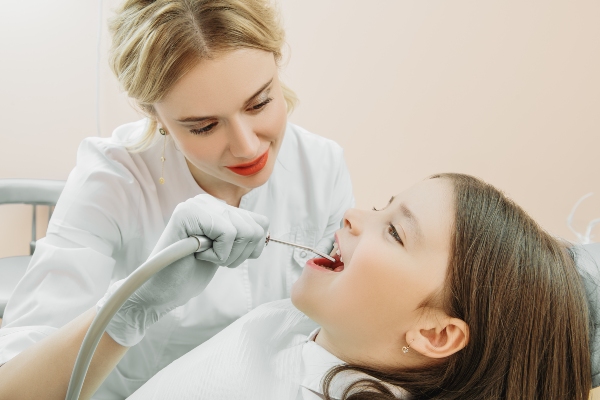 The right time to schedule a pediatric dentistry appointment for your child can vary based on a variety of factors. Routine professional cleanings and checkups are an essential part of good oral health for patients of all ages, including babies and children. You may be surprised to find out just how early the American Dental Association recommends starting routine appointments.
The right time to schedule a pediatric dentistry appointment for your child can vary based on a variety of factors. Routine professional cleanings and checkups are an essential part of good oral health for patients of all ages, including babies and children. You may be surprised to find out just how early the American Dental Association recommends starting routine appointments.
Timing pediatric dental visits
When in doubt, it is a good idea to contact your chosen pediatric dentist about what time is the right time for your child's very first checkup and any other appointments moving forward. Your child's pediatric physician may also make suggestions about when to start professional dental care.
The first appointment
Many parents think that dental care is not very important during infancy, as a child's diet consists primarily of milk for the first several months after birth. Also, baby teeth will not last forever, so there is an assumption that only permanent teeth need regular dental care. However, these views are incorrect; professional cleanings and checkups play a vital role in the future of a child's oral health, even at such a young age. The ADA recommends that parents take a child for their first pediatric dentistry visit within six months after the first tooth erupts, but no later than the age of 1.
Early dental appointments serve several purposes. First, they allow children to become acclimated to the ins and outs of a dental exam. These routine visits help kids feel more comfortable when a dentist or hygenist cleans and examines their teeth. They also allow dentists to remove tartar buildup, which leads to tooth decay. As soon as baby teeth come in, cavities can occur, even in children only a few months old.
Early checkups enable dentists to monitor the development of your child's teeth, gums, and bone structure while preventing and detecting issues early on. The sooner lifestyle changes are made or treatments begin, the better the chances of a more favorable outcome with less invasive dental work.
Routine checkups
Once your child sees a dentist for the first time, there is a good chance they will continue to do so once every six months. This is the standard schedule for both children and adults, and typical dental insurance plans cover two routine checkups per year. Research has shown that waiting much longer between cleanings increases the risks of tooth decay and gum disease, which children can be particularly prone to.
Patients with excellent dental health, no history of cavities, and no signs of potential issues may only need to be seen once a year. This is rare, though, and is a decision that should be made under the counsel of a dental professional. Pediatric dental visits should continue until age 12 or 13, or whenever all permanent teeth have come in. At this point, it will be time to transition your child to a regular dentist, although they can still be seen at a pediatric office for a few more years.
Conclusion
Regular pediatric dentistry checkups should begin early in life and continue on a regular basis. Your dentist can help you decide what timing is right for your individual child.
Request an appointment or call Jayne F. Scherrman JS Pediatric Dentistry at 573-271-3062 for an appointment in our Cape Girardeau office.
Related Posts
Pediatric dentistry focuses on oral health prevention and treatment for toddlers, early childhood, and adolescents. Tooth decay is a more common oral health concern that pediatric dentists treat. This review looks closely at how a pediatric dentist can treat (and help prevent) tooth decay.Children are highly vulnerable to cavities on primary teeth. Therefore, the primary…
Fluoride is a naturally occurring mineral that plays an important role in pediatric dentistry. When applied topically, it can strengthen tooth enamel by remineralizing teeth. As a result, teeth are better protected against tooth decay and cavities. It can be difficult to consume enough fluoride naturally through your diet, but it is so beneficial to…
Caring for your child’s knocked-out tooth can be incredibly stressful for you and your child. This pediatric dentistry guide seeks to make the process as easy as possible, ensuring children get the care they need promptly.Whether the child has endured a knocked-out tooth and needs quick answers or if parents simply want to prepare themselves,…
